Why a 24/7 Answering Service is Essential for Your Business
Customers expect businesses to be available around the clock. A 24/7 answering service ensures you never miss a call, capturing every lead, appointment, and urgent request. This article explores eight top 24/7 answering services, including AI-powered tools like Marlie AI, to help your business enhance efficiency and customer satisfaction. We'll cover AnswerConnect, Ruby Receptionists, PATLive, Specialty Answering Service, Davinci Virtual, Nexa, and MAP Communications, outlining their features, pros, and cons to help you choose the right solution.
1. Marlie Ai
For small businesses striving to provide exceptional customer service in today's fast-paced world, a 24/7 answering service is no longer a luxury—it's a necessity. Missed calls often translate to missed opportunities, lost revenue, and frustrated customers. Marlie Ai offers a compelling solution to this challenge, leveraging the power of artificial intelligence to provide a seamless, around-the-clock answering service designed specifically for small businesses. This AI-powered phone assistant ensures that every call is answered promptly and professionally, transforming potential lost revenue into valuable customer interactions. Forget the limitations of traditional answering services and embrace the future of customer engagement with Marlie Ai.
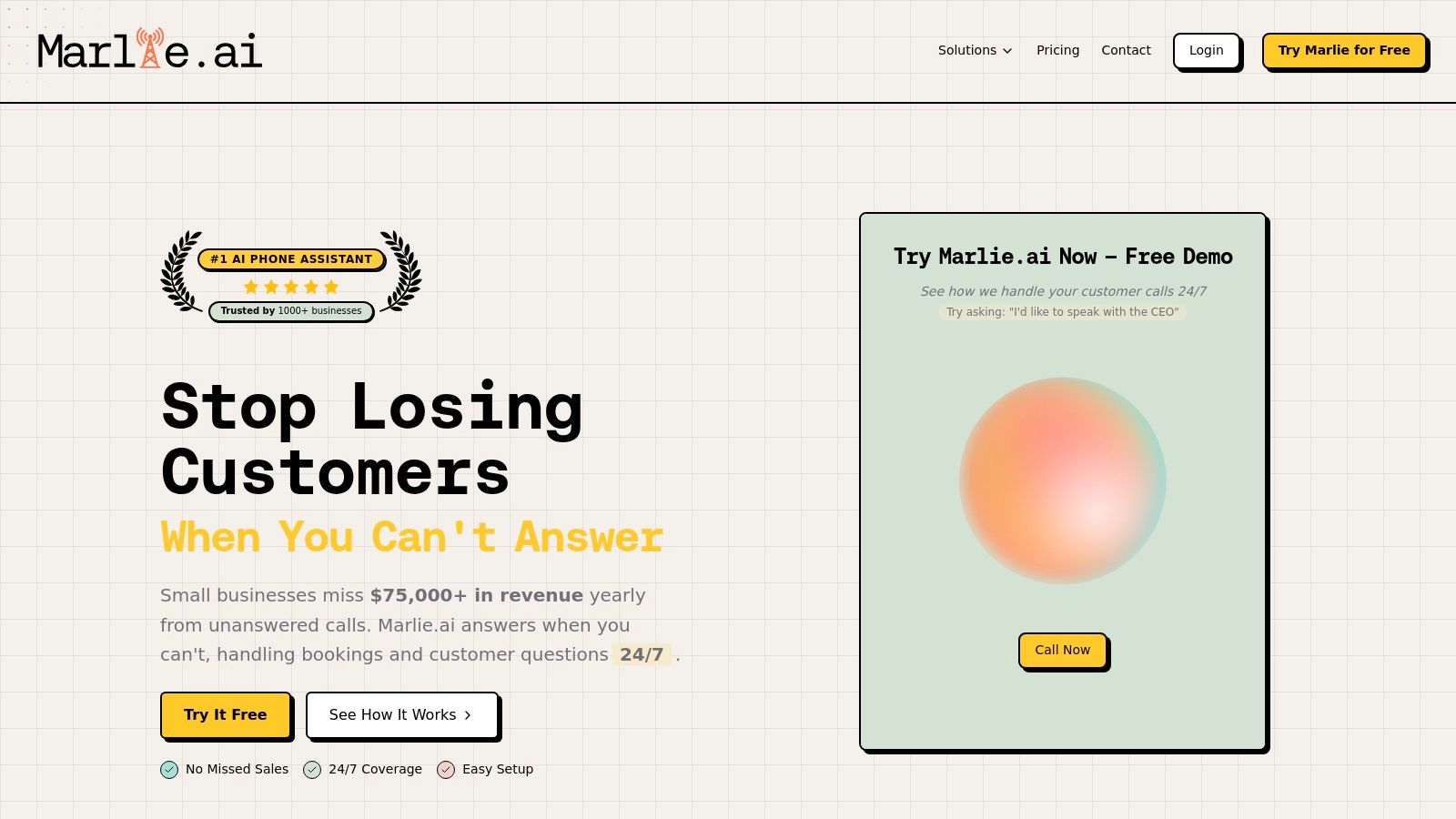
Marlie Ai goes far beyond simply answering calls. It integrates seamlessly with existing phone systems, requiring no new hardware or complicated software installations. Once you forward your calls, Marlie.ai gets to work, answering with a natural and friendly conversational tone that puts callers at ease. This sophisticated AI can handle a wide range of tasks, from booking appointments and scheduling services to processing secure payments and even providing timely follow-ups. Imagine the time savings for busy owners of restaurants, clinics, salons, or emergency service providers. Learn more about Marlie Ai and how AI is revolutionizing the answering service landscape.
The benefits extend beyond just convenience. Marlie Ai has a proven track record of boosting revenue for its clients, with increases ranging from 20% to an impressive 60%. By capturing every call, Marlie Ai ensures that potential customers aren't lost to voicemail or busy signals. This translates to more booked appointments, increased sales, and a significant improvement in customer satisfaction, with ratings consistently reaching 94%. Furthermore, by automating routine phone tasks, Marlie Ai frees up an average of 15 hours per week for business owners, allowing them to focus on core operations, strategic planning, and business growth.
The platform also provides valuable business insights through real-time analytics and call recordings. By analyzing call data, businesses can identify trends, optimize their services, and refine their customer interaction strategies for continuous improvement. This data-driven approach empowers businesses to make informed decisions and maximize their return on investment.
While the potential benefits are significant, it's important to consider the potential drawbacks. Initial customization might be necessary to ensure Marlie Ai effectively handles unique business services or frequently asked questions specific to your industry. Additionally, pricing details aren't readily available on the website, requiring direct contact for specific cost information. However, considering the potential for increased revenue and significant time savings, the investment in Marlie Ai could represent a substantial value proposition for many small businesses.
Setting up Marlie Ai is refreshingly straightforward. Simply forward your existing business number to the provided Marlie Ai number. You can then customize the system to reflect your unique business hours, services offered, and typical call patterns. This ensures that Marlie Ai provides personalized and relevant information to your callers, further enhancing the customer experience.
Marlie.ai is particularly well-suited for a diverse range of small to midsize businesses, including those with owner-operators who are constantly on the go, businesses facing fluctuating call volumes, or those requiring 24/7 availability without the cost of a full-time staff. Whether you're a plumber needing to capture leads while on a job, a restaurant managing reservations, or an emergency service provider requiring immediate responsiveness, Marlie Ai offers a scalable and cost-effective 24/7 answering service solution. It provides the personalized touch of a live receptionist without the associated overhead, fundamentally changing how small businesses interact with their customers and compete in a demanding market. By turning missed calls into opportunities, Marlie Ai empowers small businesses to grow, thrive, and deliver exceptional customer experiences.
2. AnswerConnect
AnswerConnect offers a robust 24/7 answering service designed to help businesses of all sizes enhance their customer communication and never miss a crucial call. Their core offering revolves around providing live virtual receptionists trained to represent your brand professionally, ensuring a personalized experience for every caller. This makes them an excellent choice for businesses seeking a seamless and efficient way to manage incoming calls around the clock. Whether you're a family-owned business, a service provider needing urgent call handling, or a growing enterprise looking for scalable solutions, AnswerConnect aims to provide tailored communication support. They particularly cater to service-based businesses like plumbers, appliance repair companies, and towing services, as well as health and wellness providers such as veterinary clinics and salons. Their focus on personalized interactions makes them an ideal solution for businesses prioritizing customer relationships and building a strong brand reputation. Even if you're exploring AI call center options or simply aiming to reduce overhead costs, AnswerConnect positions itself as a viable alternative to traditional in-house receptionist teams.
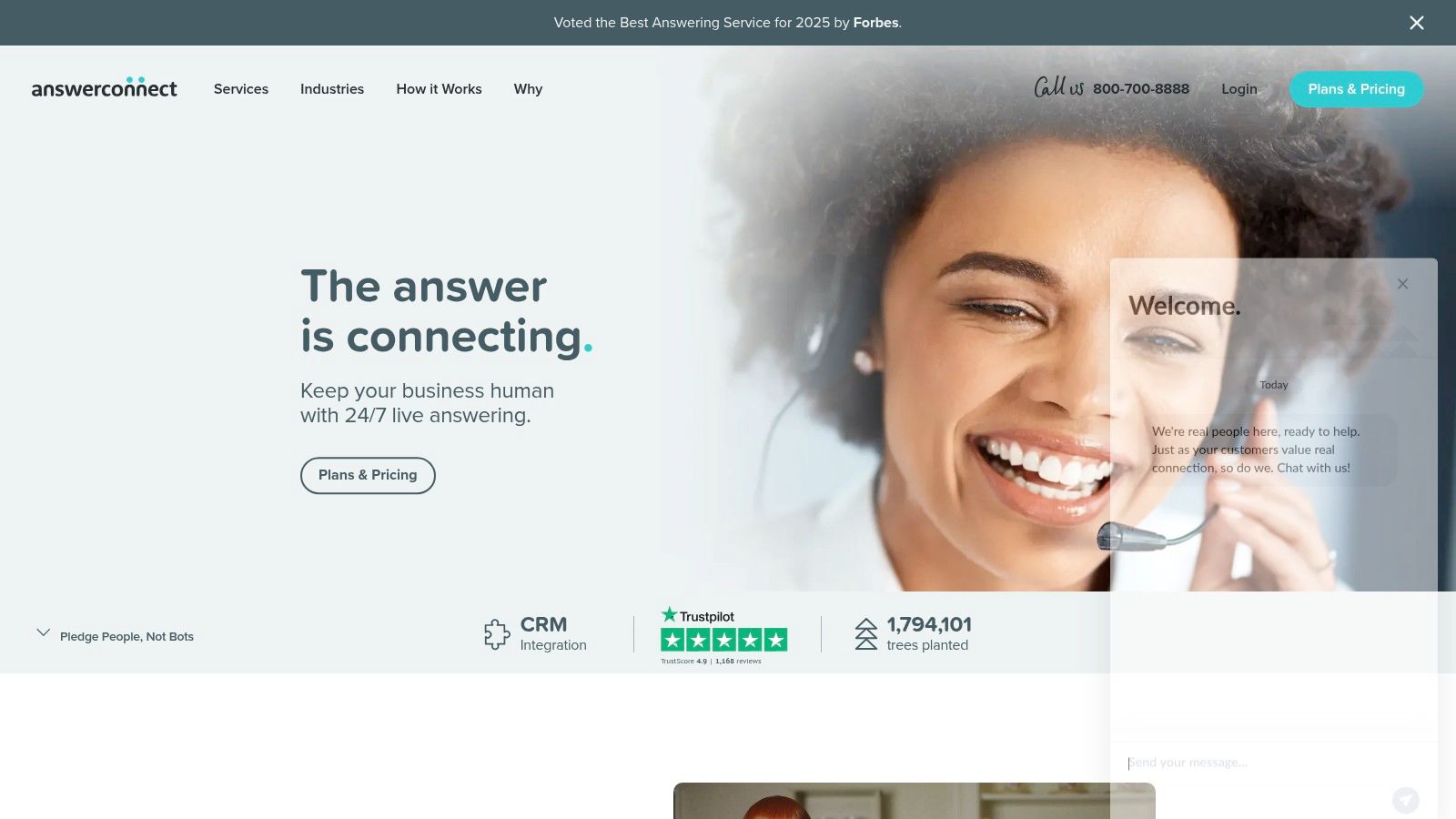
AnswerConnect distinguishes itself with its focus on highly trained and professional operators, offering bilingual English/Spanish support, a feature particularly beneficial for businesses catering to diverse clientele. Their 24/7 live virtual receptionists handle call screening and forwarding, appointment scheduling and management, and integrate with popular CRM platforms, allowing for a streamlined workflow. This is crucial for busy entrepreneurs, owner-operators like plumbers and electricians, and even emergency service providers such as locksmiths and towing companies who need constant coverage without the overhead of 24/7 staff.
For small and midsize service businesses that often lose potential jobs due to unanswered calls going to voicemail, AnswerConnect presents a solution for capturing every lead. This is particularly relevant for businesses experiencing seasonal call spikes, such as tax preparation services, snow removal companies, or landscaping businesses, who can leverage AnswerConnect's flexible coverage to handle increased demand. Even for franchise businesses, AnswerConnect offers consistent call handling across multiple locations, ensuring a uniform customer experience.
Pricing plans start at $39/month, offering flexibility for businesses with varying budgets. However, it's important to note that while this starting price is attractive, costs can escalate for high-volume businesses. The setup process, while generally smooth, may require additional time for businesses with complex requirements. Learn more about AnswerConnect and see if their offerings align with your business communication strategy.
A key advantage of AnswerConnect is its strong integration capabilities with existing business tools, further enhancing efficiency and data management. This allows for seamless incorporation into existing workflows, which is particularly useful for businesses already utilizing CRM systems. The company also prides itself on providing excellent customer service and support, ensuring a smooth experience for clients navigating the implementation and ongoing use of their 24/7 answering service.
One potential drawback is the limited customization available for certain features. Businesses requiring highly specialized call handling procedures might find this restrictive. While AnswerConnect strives to provide personalized service, the degree of customization may not meet the needs of all businesses. Therefore, it's crucial to clearly define your specific requirements and communicate them with AnswerConnect during the setup process to ensure they can effectively meet your expectations. This is especially important for businesses operating in niche markets or with unique customer interaction protocols.
For businesses searching for a reliable and professional 24/7 answering service, AnswerConnect provides a compelling solution. By offering highly trained live agents, robust features, and flexible pricing, they empower businesses to enhance customer communication, capture more leads, and ultimately drive growth. While potential limitations regarding cost for high-volume callers and customization options exist, the overall benefits, especially for small to medium-sized businesses, position AnswerConnect as a strong contender in the 24/7 answering service landscape. Their particular focus on providing personalized customer interactions makes them a valuable asset for businesses prioritizing customer relationships and aiming to provide a seamless and professional experience at every touchpoint.
3. Ruby Receptionists
Ruby Receptionists offers a premium 24/7 answering service designed to elevate the customer experience. Instead of a basic call answering service, Ruby focuses on building genuine connections and providing personalized support, acting as a seamless extension of your business. This approach makes them an excellent choice for businesses prioritizing customer relationships and a polished professional image. They cater to a variety of industries, from service-based businesses needing urgent call handling to healthcare providers streamlining appointments and restaurants managing reservations. If you’re a business owner exploring AI call centers, looking to save costs, or simply tired of losing business to voicemail, Ruby offers a compelling human-centric alternative.
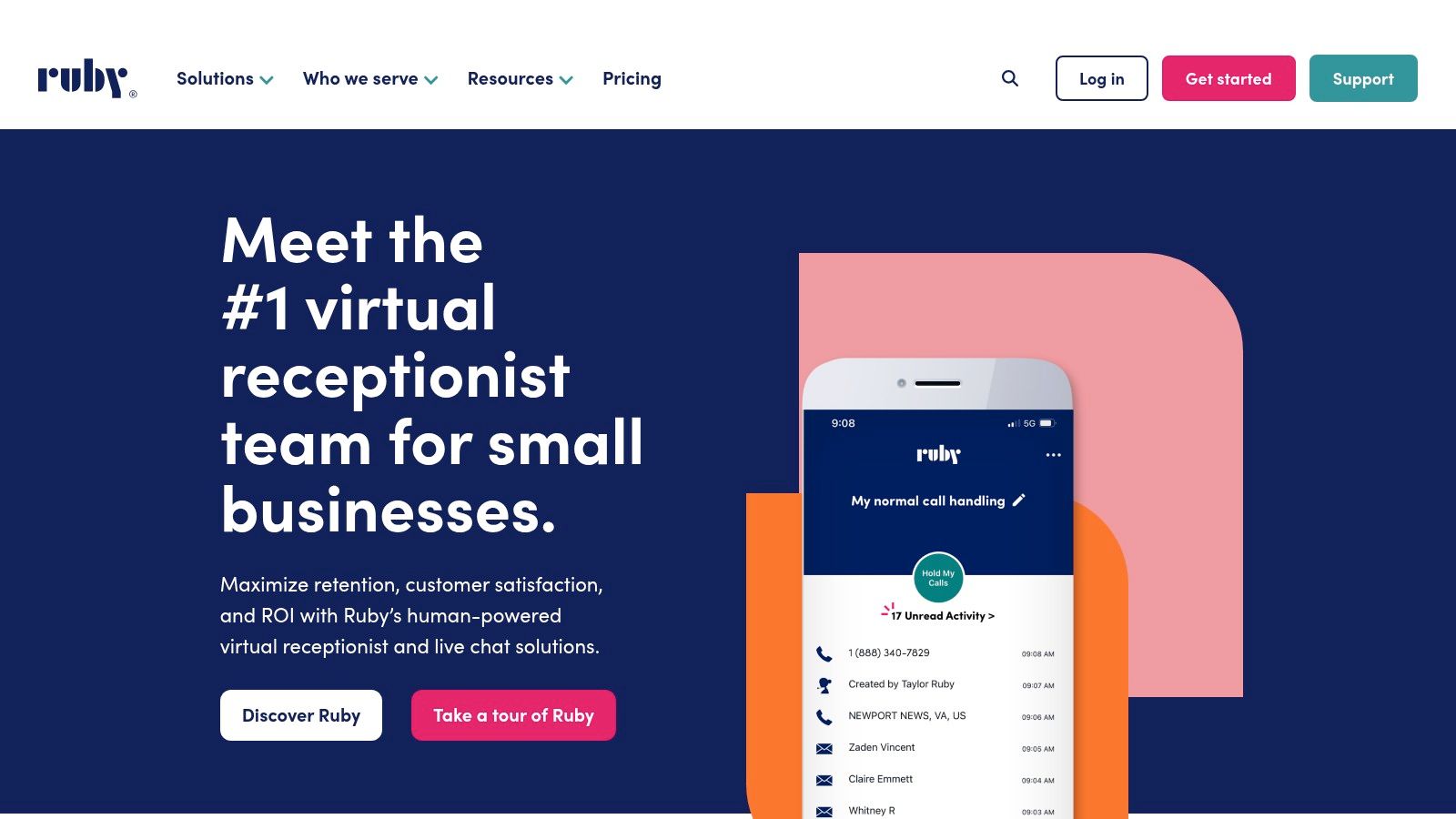
Ruby Receptionists' 24/7 answering service goes beyond simply picking up the phone. Their virtual receptionists are trained to handle a wide array of tasks, including lead qualification, appointment scheduling, and message taking. This allows business owners, especially owner-operators like plumbers or HVAC technicians, to focus on their core services without being tethered to the phone. This is particularly crucial for emergency service providers like locksmiths and towing companies, who must be available around the clock without incurring the cost of a 24/7 in-house staff.
Several key features make Ruby Receptionists stand out in the crowded 24/7 answering service market. Their live virtual receptionists handle calls with a personalized touch, using customized scripts tailored to your business needs. They integrate with popular calendar applications, simplifying appointment scheduling and eliminating double-bookings. Detailed call summaries and reporting provide valuable insights into customer interactions and call volume trends, empowering you to refine your business strategies. The user-friendly mobile app grants you real-time access to call management, allowing you to monitor calls and adjust preferences on the go. This is invaluable for busy entrepreneurs who are constantly on the move.
For service-based businesses like electricians, plumbers, or appliance repair companies, Ruby ensures that no call goes unanswered, capturing potential jobs that might otherwise be lost to voicemail. For healthcare providers such as veterinary clinics, salons, and barber shops, Ruby streamlines appointment scheduling and reduces administrative overhead, allowing staff to focus on patient care. Even seasonal businesses like landscaping companies or tax preparation services experiencing call spikes can benefit from the flexible coverage offered by Ruby Receptionists.
While Ruby Receptionists offer a high-quality service, it's important to be aware of the potential drawbacks. Their pricing structure, while justified by the premium service, tends to be higher than basic answering services. International calling options are currently limited, which could be a concern for businesses with a global clientele. Furthermore, some plans may require longer contract commitments. While cost is a factor, remember that for many businesses, the increased conversions and reclaimed time quickly outweigh the expense. Missing calls translates to lost revenue, and Ruby Receptionists acts as a revenue generator, capturing leads and scheduling appointments 24/7.
Implementing Ruby Receptionists is a straightforward process. After signing up, you'll work with a dedicated team to customize your call handling procedures, including scripting and routing instructions. They'll understand your business needs and help you maximize the service’s benefits. For businesses with multiple locations, Ruby offers consistent branding and call handling across all branches, ensuring a unified customer experience.
Compared to other 24/7 answering services, Ruby Receptionists prioritizes personalized service and building strong customer relationships. While some services may offer basic call answering at lower prices, Ruby's focus on creating meaningful connections sets them apart. They act as a trusted partner, representing your business professionally and enhancing your brand image. If you're seeking more than just a call answering service and prioritize exceptional customer service, Ruby Receptionists deserves serious consideration. Their website, https://www.ruby.com, provides further details and pricing information.
4. PATLive
PATLive offers a comprehensive 24/7 answering service designed to help businesses of all sizes, but particularly small to medium-sized enterprises, manage their incoming calls effectively. Established in 1990, PATLive has a long history of providing live answering, order taking, and customer service solutions. They cater to a variety of industries, including healthcare, legal, and e-commerce, offering both inbound and outbound call services. This makes them a versatile option for businesses seeking to enhance their customer communication and streamline their operations. For businesses looking for a reliable "24/7 answering service," PATLive provides a robust solution designed to capture every lead and ensure customer satisfaction.
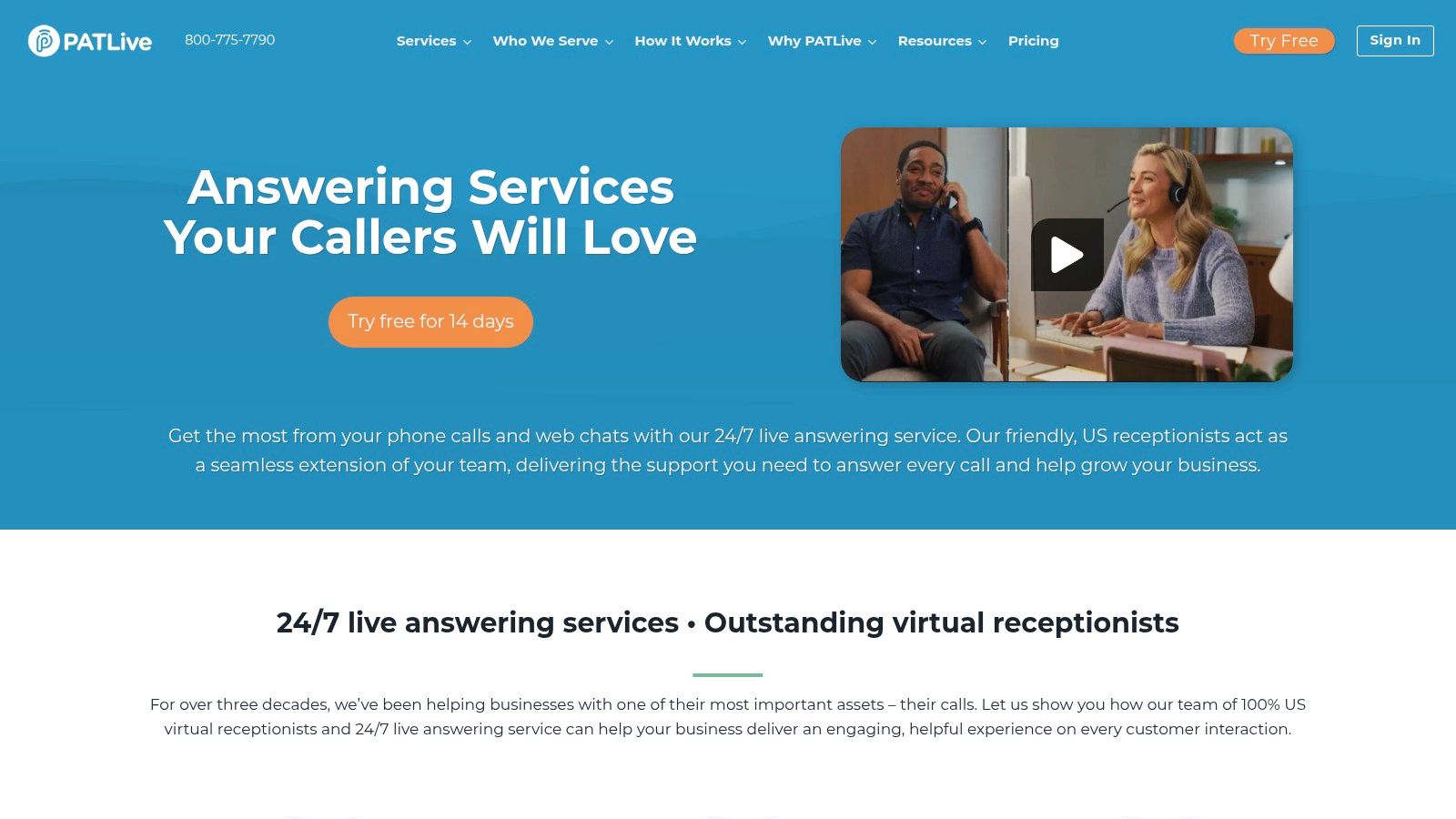
One of PATLive’s key strengths is its 24/7 live answering service, staffed by US-based agents. This feature is crucial for businesses that operate outside regular business hours or require constant availability for emergency calls. For example, a plumbing service could use PATLive to ensure that customer calls are answered at any time, day or night, allowing them to schedule emergency repairs promptly. Similarly, a restaurant could utilize the service to manage reservations and take-out orders even when the in-house staff is unavailable. This constant accessibility can significantly improve customer satisfaction and lead to increased business.
PATLive also offers a range of other features designed to improve customer interaction and business efficiency. These include order taking and payment processing, appointment scheduling and reminders, bilingual support services, and custom scripting and call routing. The ability to take orders and process payments directly through the answering service can be particularly beneficial for e-commerce businesses, streamlining their sales process. Appointment scheduling and reminders are invaluable for service-based businesses like salons, barber shops, and veterinary clinics. Bilingual support ensures broader reach and accessibility for diverse customer bases. Finally, custom scripting and call routing allows businesses to tailor the service to their specific needs and ensure consistent brand messaging.
PATLive's pricing is competitive, with no setup fees, making it an attractive option for cost-conscious small businesses. The flexible month-to-month contracts offer further financial flexibility, allowing businesses to scale their usage based on their needs. This is particularly helpful for seasonal businesses that experience fluctuating call volumes. Compared to hiring and training in-house staff for 24/7 coverage, PATLive offers significant cost savings, especially for businesses with limited budgets. This allows entrepreneurs and small business owners to reinvest those savings back into growing their business.
While PATLive provides a robust set of features, it’s important to consider some potential drawbacks. Some users report that the interface could be more modern, and the platform may lack some advanced technology features found in newer competitors. Additionally, customer service response times can sometimes vary. However, the comprehensive reporting and analytics provided by PATLive offer valuable insights into call handling and customer interactions, allowing businesses to identify areas for improvement and optimize their service.
Implementing PATLive is relatively straightforward. Businesses can work with PATLive representatives to define their specific needs and customize the service accordingly. This includes developing call scripts, configuring call routing rules, and training the agents on specific business protocols. While detailed pricing information is not readily available on their website, potential customers can request a quote and discuss their requirements with a sales representative to determine the best plan for their needs. For businesses seeking a reliable and affordable 24/7 answering service, PATLive offers a compelling solution, especially for those who prioritize live agent support and value a long-standing track record in the industry. Visit their website at https://www.patlive.com for more information and to request a quote.
5. Specialty Answering Service
For businesses seeking a personalized touch with their 24/7 answering service, Specialty Answering Service presents a compelling option. Operating as a family-owned business since 1985, they focus on delivering tailored communication solutions for specific industries. This dedication allows them to understand the nuances of various sectors, including healthcare, property management, and professional services, ensuring that calls are handled with expertise and efficiency. This makes them a strong contender for small businesses prioritizing dedicated support and industry-specific knowledge. They offer a compelling blend of personalized service and specialized expertise, making them a valuable asset for businesses looking to enhance their customer communication. For those seeking a more personal, tailored approach, Specialty Answering Service offers a refreshing alternative to larger, more impersonal call centers.
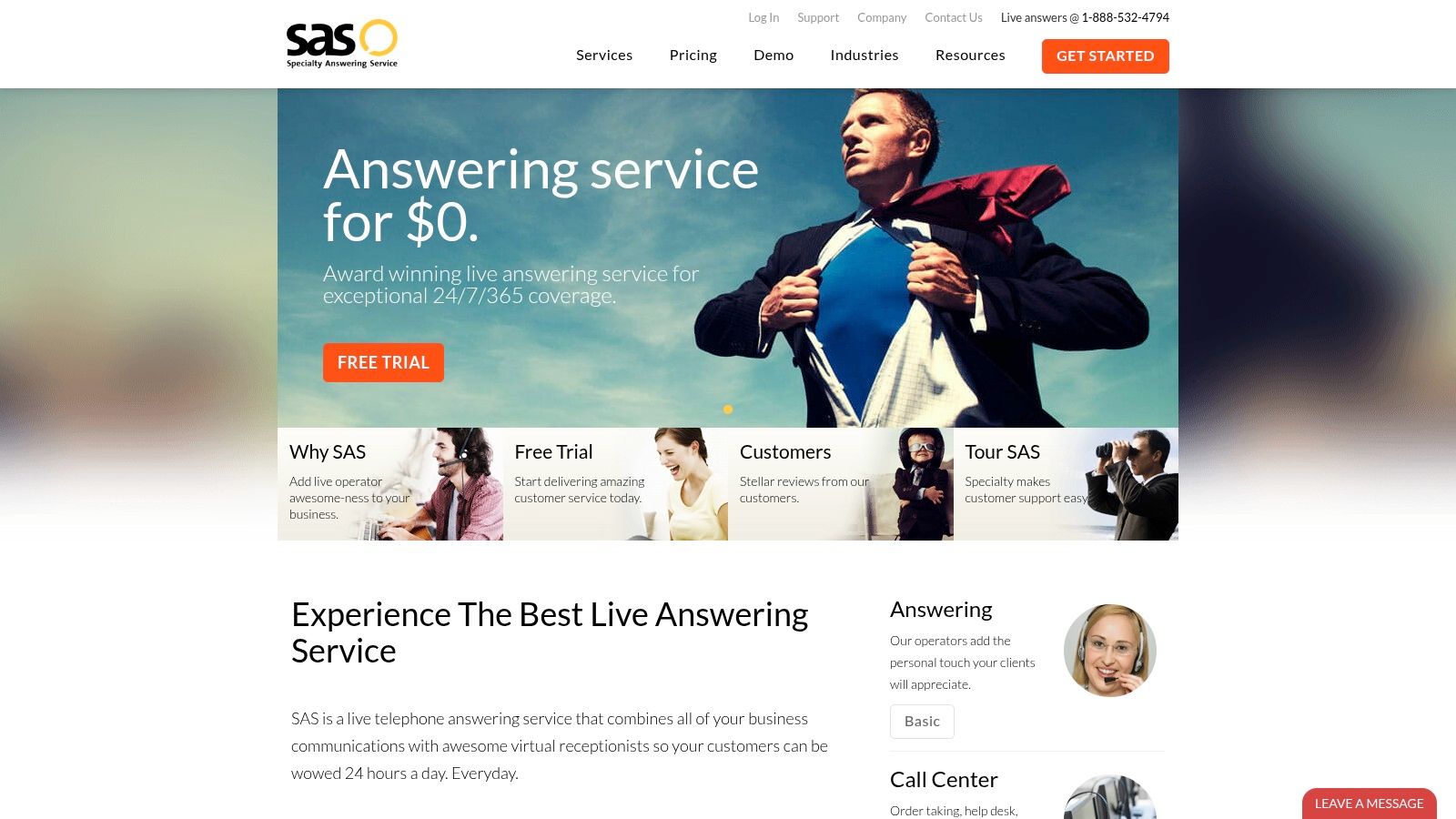
Specialty Answering Service shines in its commitment to building long-term client relationships. They achieve this through customized solutions and dedicated account management, offering a level of personalized attention often lacking with larger corporations. This focus benefits small to medium-sized businesses that require a 24/7 answering service tailored to their unique needs. Imagine a busy plumbing service relying on Specialty Answering Service to handle after-hours emergency calls. The trained agents, familiar with plumbing terminology and emergency protocols, can efficiently gather crucial information and dispatch plumbers promptly, ensuring customer satisfaction and minimizing potential damage. Similarly, a property management company can leverage the service to handle tenant inquiries, maintenance requests, and emergency situations around the clock, freeing up their internal staff to focus on core responsibilities.
Key features of Specialty Answering Service include industry-specific call handling protocols, ensuring calls are answered professionally and accurately based on the client's industry. For healthcare clients, HIPAA-compliant messaging is crucial for maintaining patient confidentiality and adhering to regulations. Emergency dispatch services are also available, making the service ideal for businesses needing immediate response capabilities, such as locksmiths, tow truck operators, or emergency restoration services. A web-based message management portal provides clients with convenient access to messages, while multilingual support capabilities cater to diverse customer bases.
While pricing details aren't readily available, their emphasis on competitive pricing and transparent billing suggests cost-effectiveness, a crucial factor for budget-conscious small businesses. Businesses considering AI call centers might find the human touch and industry expertise of Specialty Answering Service a more suitable approach, particularly for complex or sensitive situations. Learn more about Specialty Answering Service and the broader landscape of 24/7 call centers.
However, being a smaller company does have its limitations. Scalability might be a concern for rapidly growing businesses. Their technology platform, while functional, may appear outdated compared to newer, more feature-rich platforms offered by larger competitors. Integration options with existing CRM or other business software might also be more limited.
Implementing Specialty Answering Service is typically straightforward. After an initial consultation to understand the business's specific needs and industry, customized call handling scripts and protocols are developed. The service then begins handling calls, ensuring seamless integration with the client's existing operations. While technical requirements are minimal, access to a reliable internet connection and phone line are essential.
In comparison to larger, more automated services, Specialty Answering Service excels in providing personalized service. This makes them a valuable asset for small and midsize businesses seeking to enhance customer responsiveness and avoid lost opportunities due to unanswered calls. This focus on personal attention and specialized expertise makes them a strong contender for businesses that value a human-centric approach to customer communication. Whether you're a family-owned restaurant needing reservation management, a busy home-service franchise wanting consistent call handling across locations, or a seasonal business experiencing call spikes, Specialty Answering Service provides a tailored 24/7 answering service solution. This allows business owners to focus on growth and core operations, knowing their calls are handled professionally and efficiently around the clock.
6. Davinci Virtual
Davinci Virtual distinguishes itself by offering more than just a 24/7 answering service; it provides a comprehensive suite of virtual office solutions designed to give businesses a professional edge. This makes it an excellent choice for entrepreneurs, small businesses, and growing companies aiming to project a polished image without the hefty overhead of a traditional office space. While their primary focus is on virtual offices, their 24/7 live answering service is a robust component of their offering, making it a valuable tool for a variety of businesses. This includes those needing urgent call handling, appointment scheduling, after-hours support, and overflow call management.
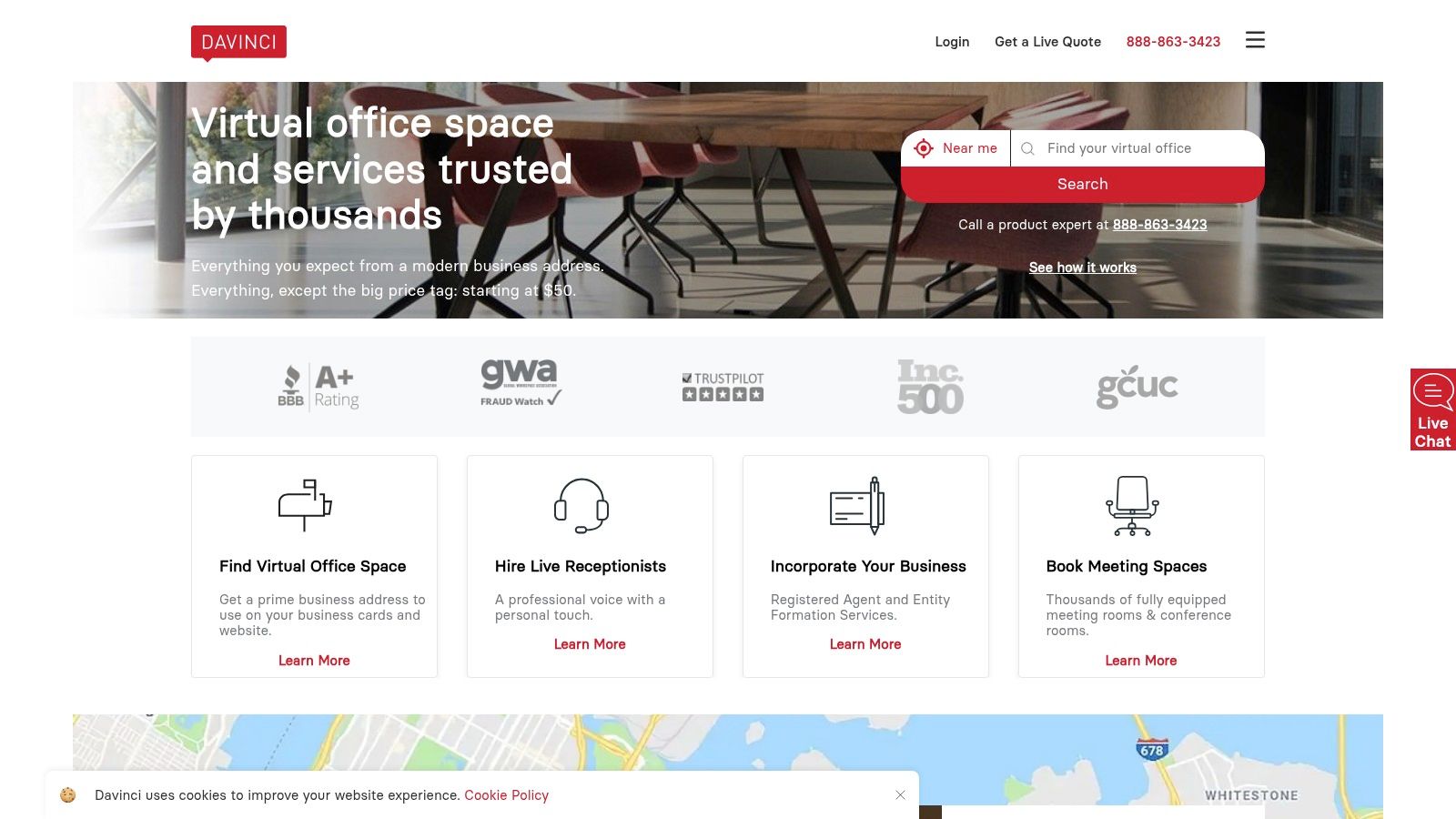
Davinci Virtual's 24/7 answering service ensures that your business never misses a call, providing a live receptionist to handle inquiries, take messages, schedule appointments, and even forward calls as needed. This is particularly beneficial for service-based businesses like plumbers, appliance repair companies, and towing services, where immediate responsiveness can be the difference between securing a job and losing it to a competitor. For health and wellness providers such as veterinary clinics, salons, and barber shops, Davinci's service can streamline appointment booking and manage patient inquiries, freeing up staff to focus on client care. Even restaurants and cafes can leverage the service to boost takeout orders, manage reservations, and handle customer inquiries during peak hours.
Beyond the 24/7 answering service, Davinci Virtual offers virtual business addresses in prime locations, giving your business a prestigious presence without the cost of a physical office. This can be particularly attractive to entrepreneurs and startups looking to establish credibility and project a professional image. The service also includes call forwarding, voicemail transcription, and even meeting room and office space rentals, providing a complete virtual office solution. These features can be bundled together in flexible packages, offering good value for businesses seeking a comprehensive solution.
For businesses exploring AI call center solutions, Davinci Virtual provides a human touch that can be crucial for building customer relationships and handling complex inquiries. While AI-powered solutions are becoming increasingly sophisticated, they may lack the nuance and empathy of a live receptionist, particularly in sensitive situations. Davinci Virtual bridges this gap, offering the personalized service of a human receptionist while still providing the cost-saving benefits of a virtual solution.
Practical Applications and Use Cases:
- Emergency Services: Locksmiths, tow truck operators, and other emergency service providers can ensure 24/7 availability without the expense of round-the-clock staffing.
- Home Service Franchises: Maintain consistent call handling across multiple locations and ensure that no lead goes unanswered.
- Seasonal Businesses: Handle call spikes during peak seasons with flexible coverage options.
- Owner-Operators: Cover the phone while out on jobs, allowing plumbers, electricians, and HVAC technicians to focus on their work.
Pros:
- Comprehensive virtual office solutions beyond just answering services.
- Professional business addresses in major cities.
- Flexible packages combining multiple services.
- Good value for bundled services.
- Live receptionist service provides a human touch compared to some AI-driven alternatives.
Cons:
- Primary focus is on virtual offices rather than solely on answering services.
- May have less specialized call handling compared to niche answering services.
- Customer service consistency can be an issue based on some user reports.
Pricing: Davinci Virtual offers a range of plans based on usage and required features. Contacting them directly for a custom quote is recommended for the most accurate pricing information.
Technical Requirements: A stable internet connection is required for call forwarding and accessing online features.
Implementation/Setup Tips:
- Clearly define your call handling needs and desired scripting for the receptionists.
- Provide detailed information about your business, services, and frequently asked questions.
- Establish clear communication channels with Davinci Virtual for ongoing support and adjustments.
Website: https://www.davincivirtual.com
Davinci Virtual's strength lies in its comprehensive approach to virtual office solutions. While its primary focus might not be solely on 24/7 answering services, it provides a robust and valuable service as part of a larger package. This makes it a worthwhile consideration for businesses seeking a professional image, cost savings, and the convenience of a virtual office solution combined with 24/7 call handling. By carefully weighing the pros and cons and understanding their pricing structure, businesses can determine if Davinci Virtual is the right fit for their specific needs.
7. Nexa
Nexa (formerly Nexus Direct) stands out as a robust solution for businesses seeking a 24/7 answering service that goes beyond simple call answering. They provide a comprehensive suite of customer engagement tools, including appointment scheduling, customer support, and lead qualification, making them a valuable asset for businesses looking to enhance their customer experience and operational efficiency. This makes them an excellent choice for businesses ranging from family-owned shops to service-based enterprises requiring immediate call handling, and even healthcare providers looking to streamline their appointment processes. Their focus on technology and trained agents allows them to cater to a wide array of business needs, particularly those who need 24/7 availability without the overhead of a round-the-clock staff.
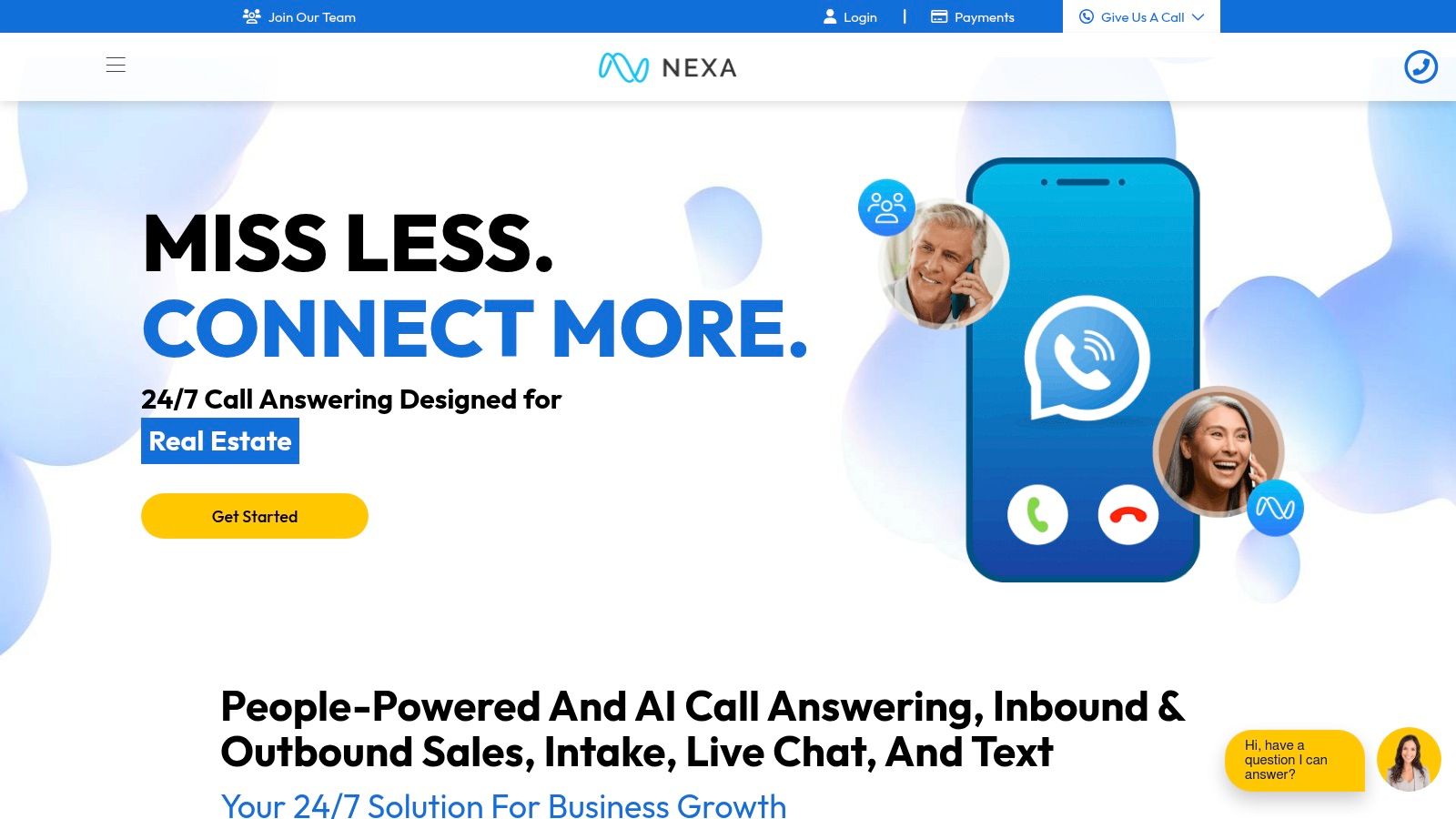
Nexa's 24/7 multilingual customer support is a key differentiator, particularly for businesses operating in diverse markets. This feature ensures that customers can connect with a live agent regardless of the time or language they speak, significantly improving accessibility and customer satisfaction. For example, a restaurant with a high volume of takeout orders can utilize Nexa's multilingual support to cater to a broader customer base and accurately take orders, even during peak hours. This multilingual support also extends to appointment scheduling, which is a significant advantage for healthcare providers like veterinary clinics or salons with a diverse clientele.
The platform's advanced call routing and IVR systems offer significant flexibility in managing incoming calls. Businesses can customize their call flows based on factors like time of day, caller ID, or the purpose of the call. This ensures that calls are directed to the appropriate department or agent quickly and efficiently, minimizing wait times and improving the overall customer journey. Imagine a plumbing company that needs to route emergency calls immediately to available technicians while directing general inquiries to a customer service representative. Nexa facilitates this seamless routing process, ensuring prompt responses for time-sensitive requests.
Another key feature is Nexa's appointment scheduling with calendar synchronization. This tool integrates with popular calendar applications, allowing businesses to manage their appointments efficiently and avoid double-bookings. This is particularly helpful for service-based businesses like salons, repair technicians, or healthcare providers who rely heavily on scheduled appointments. Think of a busy hair salon – Nexa can manage online bookings, send automated appointment reminders, and free up staff to focus on client service rather than managing the phone constantly.
Nexa also shines in its lead capture and qualification capabilities. The platform can be configured to gather crucial information from potential customers during initial interactions, qualifying them based on pre-defined criteria. This is a powerful tool for businesses focused on lead generation and sales. For example, a locksmith service can use Nexa to capture lead information during after-hours calls, qualifying them based on urgency and location, allowing them to follow up effectively the next business day. This automated lead qualification saves valuable time and resources, allowing businesses to prioritize high-potential leads.
Furthermore, Nexa offers real-time reporting and analytics dashboards, providing valuable insights into call volume, agent performance, and customer interactions. This data empowers businesses to identify areas for improvement and optimize their customer service strategies. For instance, a towing company can analyze call patterns to determine peak demand periods and adjust staffing accordingly, minimizing wait times and maximizing efficiency.
While Nexa offers a comprehensive suite of features, it is important to be aware of the potential drawbacks. The pricing for premium features can be higher compared to more basic answering services. The complexity of setup for advanced customizations might require technical expertise or dedicated support from Nexa. Additionally, the platform's extensive features might feel overwhelming for very small businesses with limited needs.
For businesses seeking a 24/7 answering service with advanced capabilities, Nexa presents a compelling solution. While the pricing may be higher for premium features and the setup might be complex for extensive customizations, the platform’s robust features, scalability, and integration capabilities make it a worthy investment for businesses aiming to enhance customer engagement and streamline operations. You can learn more and explore their offerings on their website: https://www.nexa.com
8. MAP Communications
Are missed calls costing your business valuable opportunities? In today's fast-paced world, customers expect immediate responses, and a 24/7 answering service can be the key to capturing every lead and providing exceptional customer service. MAP Communications, a veteran in the industry, has been offering just that since 1990. They specialize in providing live operator services, appointment scheduling, and customer support solutions tailored to the needs of diverse businesses. Their focus remains firmly on reliable, professional telephone answering services with an emphasis on customer satisfaction and personalized service. This makes them a strong contender for businesses seeking a dependable and experienced partner to manage their communications.
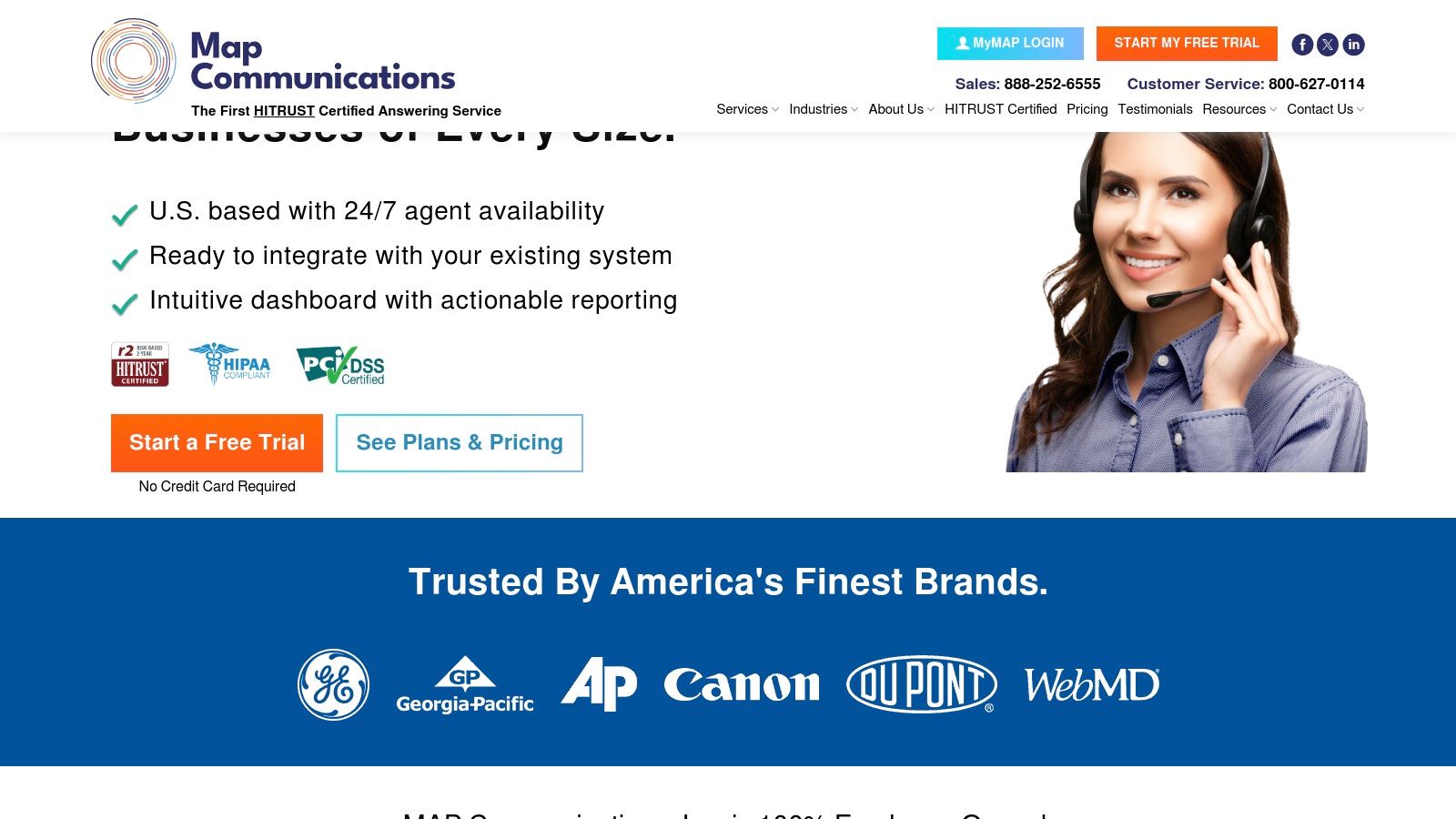
MAP Communications offers a robust suite of features designed to enhance your customer service and streamline your operations. Their 24/7 live answering service ensures that your calls are always handled by a US-based operator, guaranteeing clear communication and a professional image. This is especially crucial for service-based businesses like plumbers, appliance repair companies, and towing services, where urgent calls often require immediate attention. Customizable call scripts and protocols allow you to tailor the service to your specific needs, ensuring consistent messaging and brand representation. This personalized approach is a boon for health and wellness providers such as veterinary clinics, salons, and barber shops, allowing them to efficiently manage appointments and maintain a personalized connection with clients.
Beyond simply answering calls, MAP Communications also offers appointment scheduling and calendar management, helping businesses like restaurants and cafes manage reservations and optimize their booking process. They can also handle order taking and provide basic customer service, freeing up your staff to focus on core business operations. Message delivery via phone, email, or text ensures you're always in the loop, no matter where you are. This multifaceted approach makes them a suitable solution for businesses looking to consolidate their communication channels and improve overall efficiency. For small to medium-sized businesses, especially those providing emergency services like locksmiths and tow truck operators, having a 24/7 answering service like MAP Communications can be transformative. They can ensure consistent call handling, even during off-hours, without the expense of a round-the-clock staff.
While MAP Communications excels in providing reliable and personalized service, it's important to be aware of its limitations. Compared to newer competitors, their advanced technology features and reporting capabilities are somewhat basic. They may also lack some modern integration capabilities that businesses heavily reliant on CRM and other software might require. This is a point to consider for businesses actively exploring AI call centers or those seeking highly sophisticated data analytics. However, for businesses prioritizing clear communication, reliable service, and flexible contracts, these limitations might be less significant.
MAP Communications stands out for its long-standing experience and focus on customer satisfaction. Their flexible contracts, without long-term commitments, are particularly attractive to seasonal businesses like tax preparation services, snow removal companies, and landscapers, who experience peaks in call volume and need adaptable coverage. The responsive customer service and support provided by MAP Communications also ensures that you have a reliable partner to address any issues or concerns promptly. This is invaluable for owner-operators, such as plumbers, electricians, and HVAC technicians, who need the phone covered while they are out on jobs.
Unfortunately, specific pricing information is not readily available on their website, requiring a direct inquiry for a tailored quote. This personalized approach allows them to assess your specific needs and offer a customized solution. Technically, there are no specific requirements beyond a working phone line and an internet connection for accessing messages and reports. This simplicity makes implementation straightforward for businesses of all sizes, including busy home-service franchises that want consistent call handling across multiple locations and entrepreneurs focused on cutting overhead and reinvesting in growth.
Compared to newer AI-powered solutions, MAP Communications offers the human touch that many businesses, particularly those catering to a local clientele, highly value. While AI solutions can be efficient for handling routine inquiries, the personalized service of a live operator can build stronger customer relationships and resolve complex issues more effectively. Ultimately, MAP Communications provides a reliable and cost-effective way for small and midsize service businesses to avoid missed opportunities and ensure that every call is answered, preventing lost jobs and maximizing revenue potential. This makes them a worthy consideration for any business seeking a 24/7 answering service that prioritizes reliability, personalized service, and flexible solutions. Visit their website at https://www.mapcommunications.com for more information and to request a quote.
24/7 Answering Service Provider Comparison
| Service | Core Features / Capabilities | User Experience & Quality ★ | Unique Selling Points ✨ | Target Audience 👥 | Pricing / Value 💰 |
|---|---|---|---|---|---|
| 🏆 Marlie Ai | 24/7 AI call answering, bookings, payments, follow-ups | 94% satisfaction, 20-60% revenue ↑ | AI-driven, no hardware, real-time analytics | Small businesses (cafés, clinics) | Contact for pricing |
| AnswerConnect | 24/7 live reception, bilingual, CRM integrations | Professional agents, flexible plans | Bilingual support, strong integrations | Various industries | From $39/month |
| Ruby Receptionists | 24/7 live agents, lead qualification, mobile app | Exceptional service, detailed reports | Personal touch, call summaries | Businesses valuing relationships | Higher pricing |
| PATLive | 24/7 live US agents, order taking, custom scripting | Experienced staff, month-to-month | No setup fees, flexible contracts | Small to medium businesses | Competitive pricing |
| Specialty Answering Service | Industry-specific protocols, HIPAA compliance | Personalized service, HIPAA rules | Emergency dispatch, healthcare focus | Healthcare, property mgmt | Transparent pricing |
| Davinci Virtual | 24/7 live answering, virtual addresses, meeting rooms | Good value bundled services | Virtual office solutions, premium addresses | Entrepreneurs, small businesses | Value varies by package |
| Nexa | 24/7 multilingual support, IVR, lead capture | Modern tech, scalable solutions | Advanced routing, analytics dashboard | All business sizes | Higher for premium features |
| MAP Communications | 24/7 US-based operators, custom scripts, message delivery | Reliable operators, responsive support | Long-standing, no long contracts | Various industries | Flexible contracts |
Choosing the Right 24/7 Answering Service
Finding the perfect 24/7 answering service can significantly impact your business's success. From AI-powered solutions to live receptionists, the options we've explored – Marlie.ai, AnswerConnect, Ruby Receptionists, PATLive, Specialty Answering Service, Davinci Virtual, Nexa, and MAP Communications – offer diverse approaches to handling your calls around the clock. The key takeaway is that there's no one-size-fits-all solution. Whether you're a plumber needing after-hours support, a restaurant managing reservations, or a growing franchise seeking consistent call handling, your chosen 24/7 answering service should align seamlessly with your specific needs.
Remember to prioritize factors like budget, desired features (basic call answering vs. advanced services), and the level of human interaction you prefer. For businesses seeking cost-effective solutions and the efficiency of AI, exploring AI-powered call centers can be advantageous. Conversely, businesses prioritizing a personalized touch might lean towards services with live receptionists. Furthermore, integration with your existing CRM is crucial for streamlined operations. Consider contract terms and pricing models carefully. By thoughtfully evaluating these aspects, you're not just picking a service; you're investing in enhanced customer experience, optimized operations, and ultimately, business growth.
Ready to experience the future of 24/7 answering services? Explore Marlie.ai, an AI-powered solution designed to elevate your customer interactions and streamline your operations. Visit Marlie Ai today to discover how AI can transform your business communication.
Article created using Outrank

